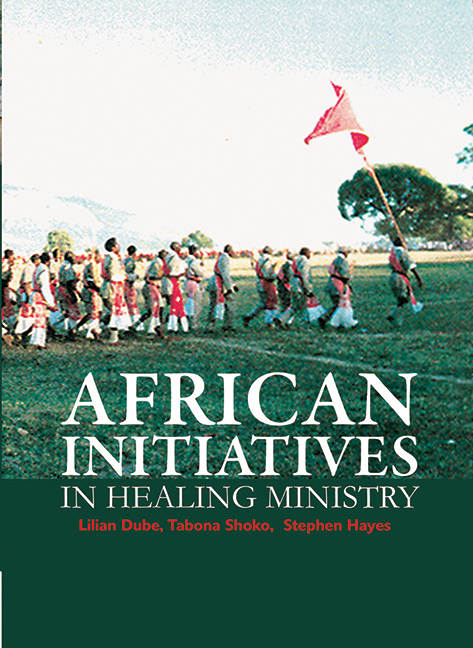A new paradigm
Published online by Cambridge University Press: 28 February 2020
Summary
An analysis of Christian healing expressed in mainline churches, namely Super Roma and Chita cheZvipo zveMoto (CZM) and an independent church, St Elijah, in the context of traditional world views yields patterns of similarities and differences in the healing praxis at various levels. In some ways mainline Christian healing resembles both traditional and independent church healing but in others it differs radically from the other two. In slightly different ways mainline churches adopt a middle position with charismatic traits and thus introduce a new paradigm in Christian healing.
All Christians in Super Roma, CZM and St Elijah attribute causes of illness and disease to menacing spiritual entities, malicious witches, sorcerers and wizards, lack of faith in God and violating divine sanctions. In this context illness and disease are a manifestation of the sacred within the profane world, calling for attention or rectification of the situation (see Eliade 1959:11–29). They are a sign of the restlessness of the spiritual realm in an attempt to mete out justice. Apparently such causal explanations characteristic of Christian healing systems correspond significantly to a traditional theory of causation which holds that spirits comprising ancestors and alien spirits, witches and sorcerers and breaking of rules of respect are an effective cause of illness and even misfortune and death.
On the issue of spirits as a cause of illness and disease, all Christians and traditionalists seem to share a common world view. In both contexts spirits are a strong force to be reckoned with. But contrary to traditional perceptions that perceive ancestors as essentially positive and benevolent, Christians view ancestors as capricious, dangerous and unpredictable. As such they are lumped together with all forces of darkness and arch enemies of God. What is striking is that in all healing systems, whether traditional or Christian, there is an underlying dichotomy between good and evil in the cosmology.
Witchcraft and sorcery emerge as a conspicuous explanation of illness and disease. Close scrutiny reveals that Christians and traditionalists share corresponding convictions. In this view the cause of evil is malicious humans who operate clandestinely under the cover of darkness. Though witches are humans, they are closely associated with spirits due to their weird character, invisibility and autonomous power. In all contexts witches and sorcerers undermine the basis of life and must be eradicated at all costs.
- Type
- Chapter
- Information
- African Initiatives in Healing Ministry , pp. 165 - 177Publisher: University of South AfricaPrint publication year: 2011



